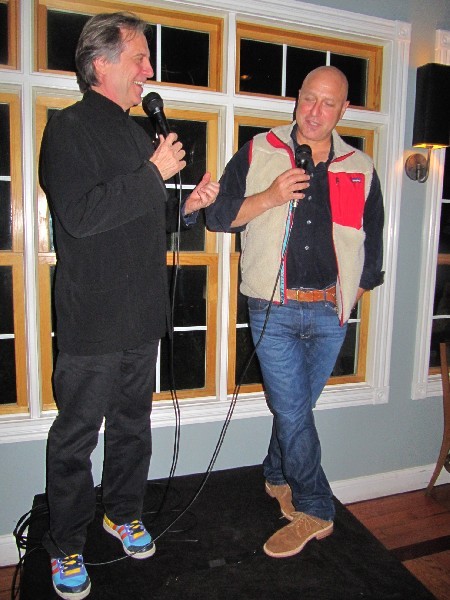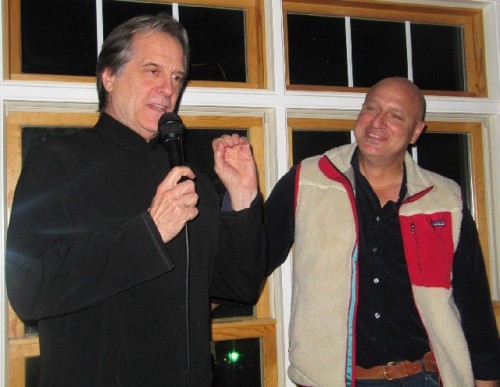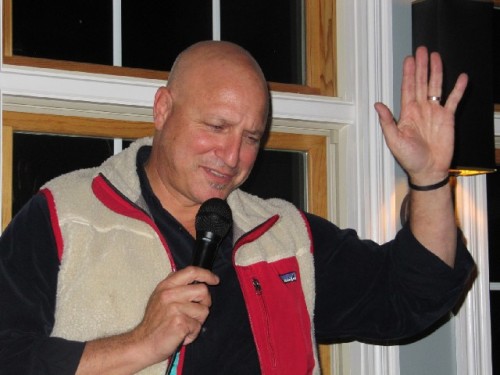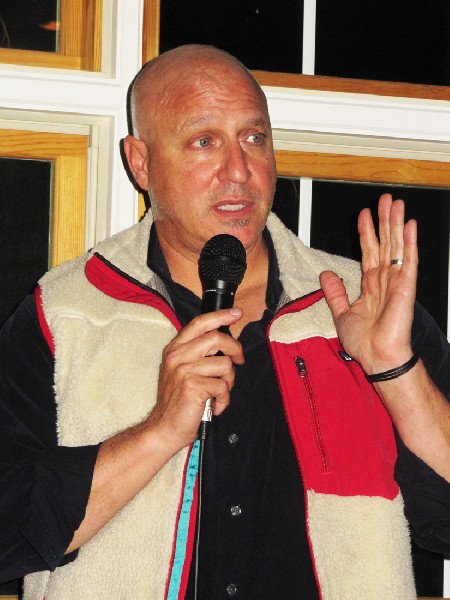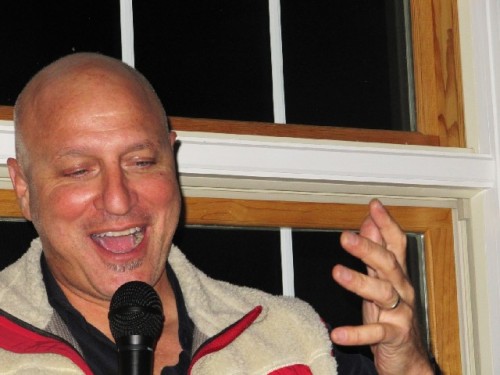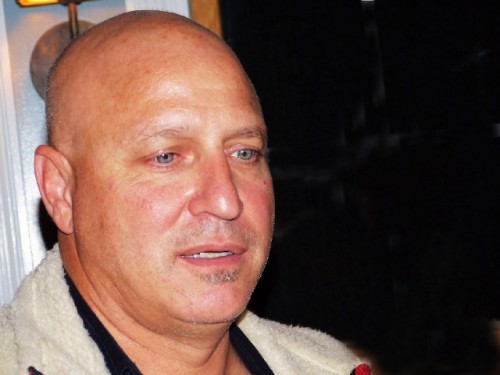Top Chef Tom Colicchio Off Camera
Dissing Michelin While Touting American Cuisine
By: Charles Giuliano - Oct 26, 2012
Charles Giuliano Last year Williamstown Film Festival presented the film Restauranteur which focused on your projects with Danny Meyer which also involved the artist Stephen Hannock who is the subject of this year’s Wolfram Hissen film Dreamscapes. Having you here tonight completes the circle of those projects which we have come to know a lot about through extensive media coverage. Can you discuss the unique vision for these restaurants that you and Danny share and how that also involves Stephen? It entails a total experience for diners and how all of the elements including food, service, ambiance and decor come together. Is it true that American cuisine is now giving the French a run for their money?
Tom Coliccho The answer to the last question is yes. Both Danny and I love art so we spoke about having art in the restaurants. People come to eat but you may as well fill the restaurant with beautiful objects as well. You can take in more than just a meal. Also we were trying to do something that was very personal to us. We went about collecting items that were personal and we wanted in our restaurants. Danny is a good friend of Robert Kushner so he has work in the restaurants. Along the way we found other pieces. Not just art but also furniture. We spent weekends traveling in Connecticut and the Berkshires looking for art. We tried to create a place that was very personal. Of course the art was an important part of that. I haven’t seen that film but I heard I was in it as well. I had hair back then. We don’t have a dress code so when Stephen shows up with paint splattered clothes we’re ok with it.
CG Can I talk with you about the American food revolution and your part in it? Also the role that Top Chef plays for you as well as its impact. It seems that chefs, including yourself, are becoming superstars.
TC I’ve heard it before that chefs are the new rock stars but I know some rock stars who are not. Somewhere along the line food became important. My theory is that after the disco craze everyone woke up from their cocaine hangovers and said we have to do something new.
CG Studio 54?
TC Exactly. Food became it. Food became popular. With chefs like Wolfgang Puck and Alice Waters (Chef, author, and the proprietor of Chez Panisse. She is an American pioneer of a culinary philosophy that maintains that cooking should be based on the finest and freshest seasonal ingredients that are produced locally. She advocates a food economy that is “good, clean, and fair.” Chez Panisse has created a community of local farmers and ranchers.) They are a part of the American food revolution.
CG Wolfgang is Austrian.
TC Yes but when he was doing French food he wasn’t that well known. It wasn’t until be began to do American food that he became famous.
CG Was your training French?
TC My training was American but I worked in France on two different occasions.
CG Where does Gordon Ramsey come in?
TC Not at all.
CG Through television he is a factor in promoting food and dining.
TC Television I think plays a small part in it. I do.
CG I’m surprised by that.
TC I think what happened as chefs became popular and restaurants became popular. People are hobbyists and food became a hobby. So what do you do when you have a hobby? First you start picking up magazines to learn more about your hobby. Then, if you want to push it further, you start buying fancy stoves and knives, pots and pans, and all that great stuff. Because you’re a hobbyist. Then you take that to the next step and you start collecting chefs. You want to learn who they are and why they’re doing what they do. You find out that some of these chefs have something to say. I think that's how it started. People wanted to know more about who was behind the food. Everything started becoming very unique. It wasn’t a scene anymore.
In France you were celebrated if you could do the classics over and over and make them perfect. In America you were celebrated by doing something that was innovative. Along with the innovation comes the stories behind the innovation. That’s how it started. Media, especially the Food Network, gave chefs a bigger platform to explain who they were and why they were doing what they were doing.
CG Where does Top Chef come into the equation?
TC Top Chef is like anything else.
CG What was your idea for it?
TC It wasn’t my idea. I didn’t start it. I wish I had. It came to me through a producer. The woman who was running Bravo decided that she wanted a show about food and chefs. A reality show about chefs. I don’t think they thought it would become as serious as it was. My biggest fear in doing the show was that it would become a joke in the industry. I was hell bent on making sure that the restaurant community embraced the show. We have to keep this authentic. We have to make sure that good chefs come in. Some of the challenges can be silly at times. But it’s still about the food. We don’t care who we’re judging we don’t care what happens. All that reality stuff that goes on in the show we have no idea that it’s happening. We’re not privy to it. We don’t care about it so we can keep it about food. I think that comes through. Prior reality shows were about eating bugs and something outrageous where this was about celebrating talent.
(Season 1 of Top Chef was taped in October and November 2005 in San Francisco. Twelve contestants lived together in a house for approximately 21 days competing in a series of challenges. The prize money awarded to the Top Chef was $100,000. The weekly series was hosted by Katie Lee Joel with regular judges chef Colicchio and Gail Simmons of Food & Wine Magazine.)
CG Can we talk about that and some of the young chefs who have come through the show.
TC Some of them are very talented.
CG What kind of impact do you have on their lives and careers through the advice you give them?
TC It’s a double edged sword. Some of it is good and some of it is not. I’m not allowed to tell them what to do but I can make suggestions. We’re not allowed to talk to them when we’re doing the shooting. Except when we’re on camera. We interact with them a little bit when they come back for reunions. They say things like "What you said to me I carry with me and they make a lot of sense."
Other than that, these are some young talented chefs. Some of these guys are really talented and serious about what they do. They have a platform now so they can go out and raise money. They can get pretty far along if they win. They can go out and get money for the restaurant that they want.
Some of them get caught up in the trap of celebrity. What do they do? They’re a young chef and maybe they have a sous chef working with them. They don’t have a deep bench and a lot of people. I can be here tonight, and not even worry about what’s going on in my restaurant, because I have guys who have been with me for a long time.
But here’s a young guy getting his shot. Maybe he won Top Chef. All of a sudden they’re at this food festival, that food festival, this and that event. Before they know it their kitchens are disasters. You still have to grow up and pay your dues. That’s why Harold (Dieterle) from season one has done so well because he’s stayed in his kitchen and that’s it. Every now and then he pop up somewhere.
(Perilla Restaurant, 9 Jones Street, NY 10014, Phone, 212 929 6868, opened in May, 2007. Perilla has just 18 tables and 10 seats at the bar. Harold Dieterle and Alicia Nosenzo have a combined 29 years of restaurant experiences. They have worked with some of the country's top chefs and restaurateurs. They worked together for 3 years at The Harrison, in Tribeca.)
Same thing with Michael.
(Michael Voltaggio is the winner of the sixth season of Top Chef. He competed with his brother, Bryan Voltaggio. Colicchio said of Voltaggio, “Out of all the cooks that have come through the show, Michael is the most talented—both from a sensibility and technical standpoint. He has the chops to pull off what he’s trying to do.” During his tenure as Chef de Cuisine at The Bazaar by Jose Andres, the restaurant was nominated for the James Beard Foundation Award for Best New Restaurant in 2008. Voltaggio was the Chef de Cuisine at The Dining Room, Langham Huntington Hotel & Spa in Pasadena, which is the recipient of several culinary awards, including the AAA Five Diamond Award, the Mobil Five-Star Award, and a Michelin Star, one of the few held by restaurants in the US. He left The Dining Room in 2010 opening his own restaurant ink. in West Hollywood, CA. His goal was to create "modern Los Angeles cuisine." It was named America's best new restaurant by GQ Magazine in March 2012. He opened a smaller restaurant around the corner, a sandwich shop called ink.sack which he designed and built himself.)
When I was a young chef and had my first kitchen I was there from ten in the morning until ten at night. I didn’t leave. Back then, there was no reason to leave. We didn’t have Food and Wine Festival in Miami, San Francisco and New York. All we had was Aspen. There weren’t distractions. Now it takes real focus to stay in the game.
CG Can you comment on the Michelin Guide and its relevance?
TC I’d rather not.
CG Tell me why not and perhaps that’s the answer.
TC John Mariani, sometimes I like his writing, he wrote a great piece on the Michelin Guide in Esquire Magazine. The Michelin Guide came out and said we have the same criteria here as we do in France. It’s clear that they don’t. There are some restaurants which would never get a star. Michelin told Le Bernadin (155 W 51st St, New York, NY 10019) that they would never get a third Michelin star (the highest rating) because they don’t serve fish.(Actually Le Bernadin priamrily focuses on seafood and added a few meat dishes to earn their third Michelin star.) Now there are restaurants getting stars and there’s a block of wood you’re sitting on. The food can be delicious, but still, there’s more to it than that. In France you can’t get two stars unless you have one. The first year you’re open you’re eligible for one. One only. Now there are restaurants opening in the States and they’re getting two.
CG Isn’t another criterion the depth of the wine cellar? How can a new restaurant achieve that unless there is an enormous initial investment?
TC Right. Not only that but I don’t believe you can compare French and American restaurants. There (France the judges) they know what to expect. Here there are so many restaurants so how do you create criteria for all those different kinds of restaurants? Plus, I know for a fact, in this current Michelin write up nobody came to visit my restaurant. Because it’s the same writeup we had last year and the year before.
CG Colicchio & Sons?TC Yeah. Same writeup. For Craft (43 East 19th Street) the writeup says something along the line of “It’s equivalent to eating snacks.”
(“There is no overt theatricality to the food at Craft. Its presentation is simple, even plain. But such simplicity belies a truth about the restaurant’s cooking. There can be no hiding behind artifice. No lipstick is available for the pigs.” The New York Times, Three Stars, 2011. James Beard Award for Best New Restaurant. In 2010, Colicchio won the James Beard Award for Best Chef. )
You know what it’s a guide book. Only a guide. I got in trouble when I had one star and said that “The reviewer of record is the New York Times. I grew up not with Michelin stars but with New York Times stars.” (For Michelin the top rating is three stars, for the NYT it's four.)
CG Did you grow up with Julia Childs?
TC I told Julia Childs when I first met her “I would love to say I really watched your show” but my first impression was seeing Dan Ackroyd cutting off his fingers playing Julia Childs on Saturday Night Live. That was very funny and she got a kick out of it. I got to know her pretty well. We shared a birthday.
CG She kind of started the American food revolution.
TC Of course. Of course. She was the first to put food on TV. We share a birthday, August 15. There was a friend who would take her to my restaurant every year around my birthday. We owe a lot to her. There were people doing food on TV way before me. This may sound really odd but they weren’t professional chefs. Julia was a teacher and cookbook author. The breakthrough came with food magazines where working chefs had a forum to show what they do. Then the food festivals. The TV thing, I swore I would never do it. I said no four times before I said yes. That sounds like I was against something before I was for something. Like pro choice.
I really thought that this show that I’m on might last for two seasons. My family would see it and make fun of me. But it just kind of grew. Like anything else it started really small and grew and grew and grew.


